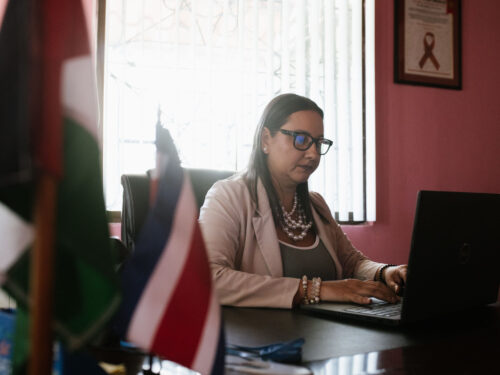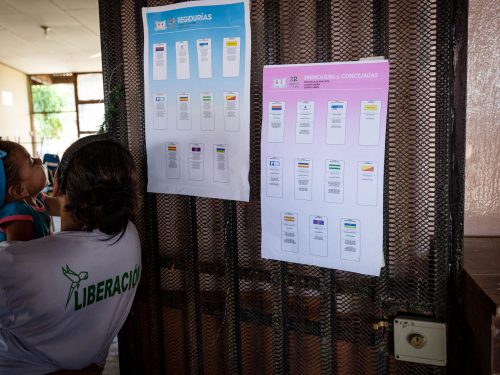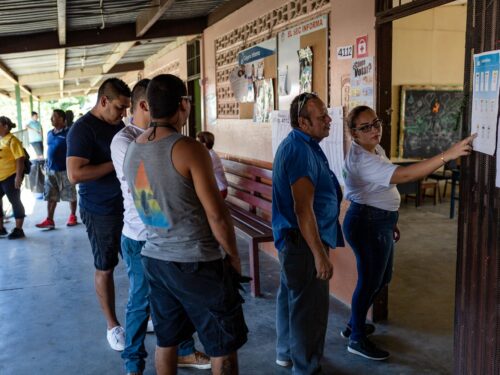
Two vice mayors of Guanacaste who have been in office for two terms are hoping to serve a third term in those municipalities, now governing as mayors. They are Verónica Campos Barrantes from Hojancha and Leidy Rodríguez Pérez from Cañas.
Barrantes was elected vice mayor for two terms (2016-2020 and 2020-2024) with the Citizen Action Party (Spanish acronym: PAC) and is currently running for mayor with the Christian Social Unity Party (Spanish acronym: PUSC).
With the National Liberation Party, Rodríguez Pérez of Cañas was elected as first vice mayor in 2016-2020 and then for 2020-2024, she was second vice mayor, but moved up to first vice mayor after Luis Fernando Mendoza, who was elected mayor in 2020, took on the role of legislator at the national level.
Currently, Rodríguez is the candidate for the canton’s ruling party, National Liberation.
Law 10,183, approved in 2022, reformed the Electoral Code to limit consecutive reelection for more than two terms for municipal officials elected by popular vote.
However, after two years in the position, vice mayors can aspire to lead the mayor’s office. Nonetheless they are prohibited from running for other municipal positions such as re-election to vice mayor or becoming municipal council members, for example.
“It was an affirmative action based on gender,” explains political researcher Eugenia Aguirre, “because the majority of vice mayor’s offices are held by women.”
Council Members Out
The prohibition on re-election also applies to municipal council members, mayors, syndics (district representatives) and district council members.
The Voice of Guanacaste reviewed the lists of municipal council members elected in previous terms and counted four male and one female council members who could not seek re-election.
They are Omar Cruz Jiménez from Santa Cruz, Roberto Canales Canales from Carrillo, Dinia Porras Alemán from Hojancha, and José Ángel Acon Wong and Irene Bolivar Jimenez from Cañas. All of them have already had at least two terms as regular council members.
Mayors Who Run For More
Five mayors in the province are seeking re-election to govern their cantons for four more years: Luis Alonso Alán Corea from La Cruz, Luis Gerardo Castañeda Díaz from Liberia, Jorge Luis Alfaro Orias from Santa Cruz, Carlos Armando Martínez from Nicoya and Heriberto Cubero Mora from Abangares.
Of them, the only one who changed political parties to seek to continue in the municipal seat is Luis Gerardo Castañeda, who was elected for the 2020-2024 term with the Christian Social Unity Party but who currently aspires to re-election with the United We Can Party (founded by the current vice president of the Republic, Natalia Díaz Quintana).
Four other mayors in the province were left unable to aspire to govern their cantons again. These are Juan Pablo Barquero from Tilarán, Giovanni Jiménez from Nandayure, Carlos Cantillo from Carrillo and Eduardo Pineda from Hojancha, since all of them have already been serving as mayor for at least two terms.

The former mayor of Cañas, Luis Fernando Mendoza, would not have been able to either, had it not been the case that in the middle of his second municipal term, he was elected as a legislator, a position that he will serve in until 2026.
About the Law
Law 10,183, approved in 2022, reformed the Electoral Code to limit the consecutive re-election of municipal officials elected by popular vote.
According to the change, officials may be re-elected only once. After that, they must wait for two terms (that is, eight years) to pass before running for office again. Each position has different conditions and rules.
After two terms in power, mayors can’t be re-elected for a third term either in the mayor’s office or in any other position.
Municipal council members, syndics, district administrators and district council members can’t aspire to the same position or as a substitute for their respective positions, but they can opt for another position, for example in council members or syndics.
And those who hold office as vice mayor are prohibited from aspiring to the same position, to be a municipal council member or a syndic, but they can aspire to the mayor’s office, for example.







Comments